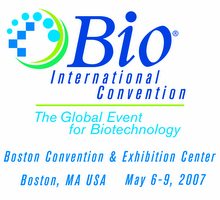On Tuesday late afternoon, a few lone protesters across the street from the Boston convention center caught my eye as they were holding up a large banner that read "Life Is Not Patentable." I really wanted to know why they were against biotech patents so I made my way over to their gathering and talked to a few of the protesters at length. I wanted to understand their point of view. What I found is that biotechnology patents are not their real concern.
Anne Fletcher, an ecologist from Ohio, is not a radical or uninformed. She holds a Bachelor of Science degree and made it very clear that they are not afraid of biotech because they do not understand biotech, they fear biotech because they do understand it. Their fear is of the unintended consequences we may face decades after the fact.
While the group indicated that they are concerned that crops are now manipulated genetically and then planted without fully knowing the consequences, Fletcher indicated that a main concern is the growing trend towards large-scale farming based on only a few select crop strains. While this is really not an issue specific to biotechnology, the industry does play a role in the decrease in biodiversity as farmers plant more acres of fewer strains.
Tom, a vegetarian who declined to give his last name, felt concerned about the fragility of our world's food supply and about the possibility of unintended consequences, pointing out the recent findings showing fewer insects and seeds to support wildlife with GM sugar beet and rapeseed. He felt that farmers have placed their trust in the hands of the biotech companies and must rely on them to act in a responsible manner.
According to genetic theory, the more uniform a crop is in genetic makeup the more easily it could be wiped out by disease. But, the non-GMO crops currently cultivated are not very diverse either and are already quite genetically similar. Also, unintended and unwanted consequences are not unique to GM plants. Nature manages to come up with a wide selection of new variations all by herself. Others would point out that humans have been genetically modifying our food crops through breeding methods to improve yield since the beginning of farming -- only the efficiency has changed.
Despite their banner, the group never really expressed a concern about patents. The take home message was that the industry must ensure adequate testing and safeguards. Biotechnology can be a great force across the planet helping farmers produce higher yields on less land and reducing the amount of harmful chemicals used by many traditional farmers. At the same time, with great power comes great responsibility -- to paraphrase the Spider-Man movie.
Wednesday, May 9, 2007
Protesters Fear Unintended Consequences
Posted by Stephen Albainy-Jenei at 7:12 AM 1 comments
Labels: biotech protests
Subscribe to:
Comments (Atom)

